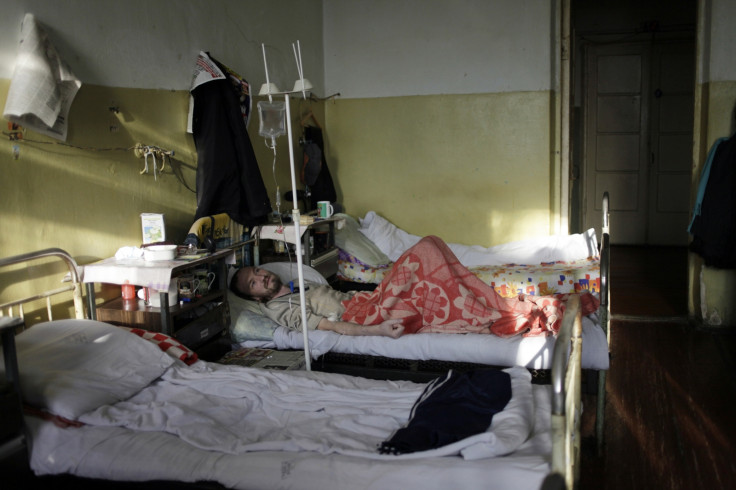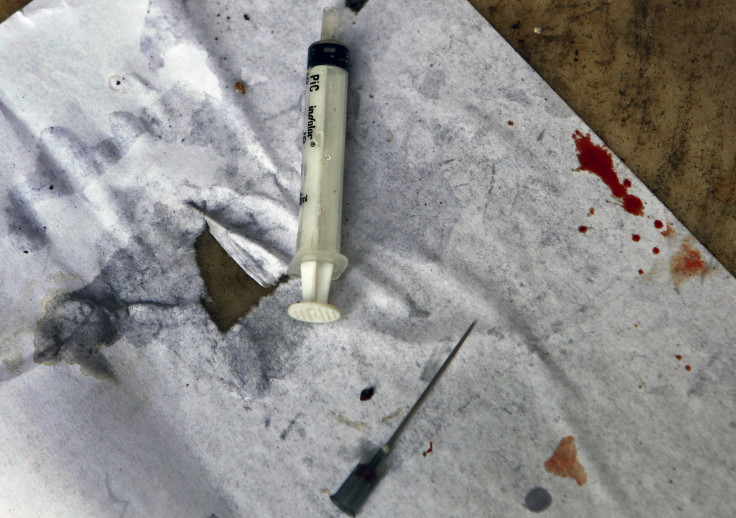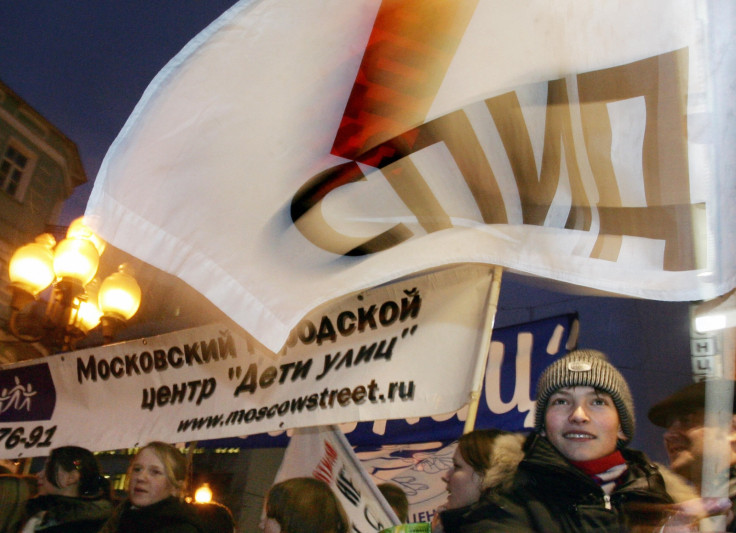Why are HIV rates so high in Russia?
Russia is home to one of the fastest-growing HIV and AIDS epidemics in the world.

Olga Vladimirova is 27 and lives in Saint Petersburg. She was diagnosed with HIV in 2011 after contracting the virus from her husband, who didn't know he was positive. She found out when she was tested while pregnant with her son.
"After my diagnosis, I felt insane. I wanted to kill myself," she said. "At that time, I didn't know anything about the virus, only bits of information from the press and the TV. In Russia, there are problems with educating people about the disease. There are many myths."
Shortly after she found out, Vladimirova's husband encouraged her to read propaganda about HIV denialism – the belief, contradicted by medical evidence, that the virus does not cause AIDS.
"He started to show me films like House Of Numbers and articles which denied the viral nature of HIV and AIDS," she explained. "I skipped the words of real doctors and because of this, I didn't take treatment."
Vladimirova's husband left her when her son was born HIV positive. She began to find out more about the virus, sought the advice of doctors and began HAART – highly active antiretroviral therapy treatment.
Her life is back on track but she has only told her boyfriend, family and a handful of her closest friends that she has HIV. She said there is still a stigma surrounding the virus in Russia.
"In this country, coming out with HIV can destroy your life. People hate HIV and fear it," Vladimirova said.
While HIV infections globally have declined, rates remain high in Russia. Ten years ago, 170,000 people in the Russian Federation had human immunodeficiency virus. The estimated number now is 1.2 million and the state accounts for over 55% of all new HIV infections reported in the European region.
Russia is home to one of the fastest-growing HIV and AIDS epidemics in the world, abetted by policies that promote infections rather than curbing them.

Drug laws
Russia has 1.8 million people injecting drugs, around 2.3% of the country's population. The country is on the drug highway from Afghanistan to Europe, along with the former Soviet states of Kazakhstan, Kyrgyzstan, Tajikistan and Uzbekistan. Each country has seen HIV infection rates climb since the USSR broke up in 1991.
Despite this, HIV prevention services are largely inaccessible in Russia. Opioid Replacement Therapy is banned and in 2008, only 7% of Russians injecting drugs had access to clean needle exchange programmes.
Michel Kazatchkine, UN Secretary-General's Special Envoy for HIV/AIDS in Eastern Europe and Central Asia, said the epidemic had been caused by injecting drug use and has now spread to the general community. Yet this could have been avoided with "large-scale harm reduction programmes", such as OPT.
Used to wean drug users on to longer-acting opioids such as methadone or buprenorphine, the treatment is successfully used in states across the world. But under Russia's federal law on narcotic and psychotropic substances, introduced in 1997, the use of both drugs is prohibited.
After Russia annexed Crimea in mid-March in the wake of Ukraine's political upheavals, Russian officials informed 800 methadone recipients that their prescriptions would cease. One methadone user from Sevastopol told the media it was happening at such a pace that there would be a "massacre". According to reports, around 20 people being treated with the drug died in the three months following the ban.
In comparison, Ukraine has seen a decrease in HIV rates every year among those who inject drugs since methadone was made legal in 2007.

Martin Donoghue, the programme manager for HIV and AIDS at the World Health Organization, told IBTimes UK removing barriers to HIV services was essential to bringing the epidemic under control.
"It is complex and, without implying direct causality, countries with repressive drug and homosexuality laws will likely also have high HIV rates," he said.
"Russia has restrictive drug laws. It is the one of a few countries in Europe that prohibits the use of methadone and has been criticised for laws, policies and practices relating to sex between men.
"Russia also has one of the highest rates of HIV infection in Europe and certainly reports the most cases in Europe.
"Laws, policies and practices should be reviewed and revised where necessary, and countries should work towards decriminalisation of behaviours such as drug use and injected, sex work, same-sex activity and non-conforming gender activity."
Limited medication
For Russia's HIV patients, the medication they desperately need to stave off the progression of their illness is not always available.
Until mid-2013, the state health ministry had run a centralised system to provide medication such as antiretroviral therapy. But last year, the ministry handed the responsibility to regional authorities.
The website Pereboi.ru was set up to track shortages in medications for HIV-positive patients and since the change, it has been inundated with messages.
"For the third month in a row, I am unable to get my full set of medications," one user from Murmansk wrote.
Dr Jeffrey Samet, a professor of medicine and community health services at the Boston University School of Medicine, recently authored a study on HIV rates in Russia.
"The use of antiretroviral therapy occurs but it is insufficient," he said. "And, as is the case in many countries, addressing stigma regarding HIV infection and illicit drug use is also needed to halt the epidemic."

Sexuality
In 2013, Russia's national parliament, the State Duma, passed a federal law banning gay "propaganda", amid a Kremlin push to enshrine deeply conservative values. Since then, violence against LGBTQ communities has rocketed and any information on homosexual rights and health has become sparse.
Russian national Erik Kivexa, 39, lives in Riga, Latvia. He caught HIV from his ex-boyfriend in 1999.
"Everyone who knows I'm HIV positive, including friends and doctors, have always treated me normally," he said. "But then again, I don't live in Russia anymore."
"Homophobia is partly generated by the state but it is also generated by people who have low levels of education and understanding," Kivexa added. "It's partly the state's problem but it goes further than that."
Those who violate Russian President Vladimir Putin's ban on "propaganda of non-traditional sexual relations" face arrest and, at best, large fines but the law has had a knock-on effect on information regarding HIV – something many people desperately need. It hinders access to prevention services and thus, the disease continues to spread.
Caitlin Mahon, campaigns officer for the international HIV and AIDS charity Avert, said that although the HIV epidemic among homosexual men is seemingly small – with just 1,718 cases of infections for the whole of Russia – stigma and discrimination towards LGBTQ communities has likely led to significant under-reporting.
"This could be a hidden epidemic," Mahon said. "It is highly likely that the reported numbers do not reflect the reality of the situation, meaning that the burden of HIV among Russian homosexual communities is largely unknown.
"At the societal level, LGBTQ communities in Russia often experience hostility and discrimination, with instances of violence and public humiliation reported.
"All of these factors will propagate increased HIV risk taking behaviour, and hinder the availability, access and uptake of HIV services."
Names may have been changed.
© Copyright IBTimes 2025. All rights reserved.






















